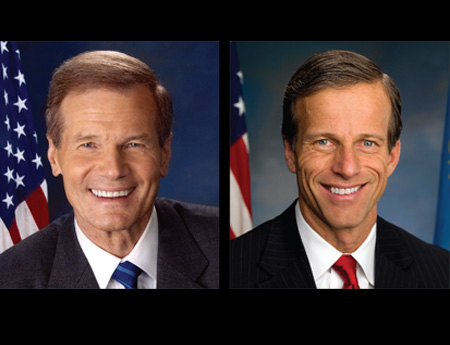Election Brings Change To Congressional Panels

The smarter way to stay on top of broadcasting and cable industry. Sign up below
You are now subscribed
Your newsletter sign-up was successful
No matter who wins the Senate in this week’s midterm elections, some familiar faces in key communications committees will be gone.
Three of the most veteran legislators on the communications front, all Democrats, are retiring after, collectively, almost 130 years in Congress, give or take a recess or two.
Those are Sen. Jay Rockefeller (D-W. Va.), chairman of the Senate Commerce Committee; Rep. Henry Waxman (D-Calif.) ranking member on House Energy & Commerce, and Rep. John Dingell (D-Mich.), the longestserving member of Congress in history.
Dingell, long a friend of broadcasters, who pushed for resolving border issues before conducting the incentive auction, is, as one cable lobbyist put it, irreplaceable.
But who succeeds Rockefeller and Waxman in those leadership positions could help determine the direction of key communications oversight bodies.
Waxman has been a foe of mega-mergers and loosening broadcast ownership restrictions. Rockefeller has been a critic of consolidation as well, and has focused the committee on cybersecurity, privacy and content issues, including TV violence. Both have been very active in the communications space.
If the Democrats pull off an upset and manage to hold the Senate, Sen. Bill Nelson of Florida is expected to succeed Rockefeller.
The smarter way to stay on top of broadcasting and cable industry. Sign up below
That could put more power in the hands of the chairman of the Communications Subcommittee since Nelson has not been very involved in communications issues on the committee.
Rockefeller tended not to distribute power to the subcommittee, points out one former congressional staffer, but Nelson may move in the other direction and give the Communications Subcommittee more power to call hearings.
That chairman could either be Mark Pryor (D-Ark.), the current Communications Subcommittee chair, or someone else if Pryor loses—though if Pryor loses it is more likely that it will be a Republican heading the committee since his is one of the closecall seats that will determine control of the Senate.
If it is not Pryor, Claire McCaskill (D-Mo.), current chair of the Senate Consumer Protection Subcommittee, could be in line for the post. That could give some cable operators pause. McCaskill has been hammering them over cable prices and service.
If the Republicans win the Senate, it will almost certainly not be the two-thirds seats to overturn a presidential veto. If, therefore, a Republican Congress tried to step in to block FCC network neutrality rules, open Internet fan Barack Obama would almost certainly veto.
A Republican victory may mean Sen. John Thune of South Dakota replaces Rockefeller. That would be a plus for cable operators and of some concern to broadcasters: Thune teamed with Rockefeller on the Local Choice proposal that would have nixed the retrans regime. Like Rockefeller, he has been active on the telecom front and would be expected to continue in that vein.
But factoring into the committee activity could be the 2016 presidential race. Thune has been talked about as a possible candidate, while two other members of the Commerce Committee, Ted Cruz (R-Texas) and Marco Rubio (R-Fla.) are also in the conversation.
In the House, Republicans will remain in control, but Waxman’s exit as the ranking member of the Energy & Commerce Committee opens up a slot for, likely, either Rep. Anna Eshoo (D-Calif.) or Frank Pallone (D-N.J.). Pallone has the seniority; Eshoo has made a louder mark.
FCC PUTS THE TOP UP
The FCC has begun what could be a long and contentious process to determine how to regulate over-the-top (OTT) video providers.
Citing CBS and HBO OTT efforts among many others, FCC chairman Tom Wheeler has finally circulated a proposal to define linear OTTs as multichannel video providers, at least in terms of access to programming and negotiation for retransmission consent.
B&C first reported on the draft Notice of Proposed Rulemaking (NPRM) almost a month ago.
The proposal asks, but does not answer, what responsibilities those OTTs will be subject to. In fact, the FCC is suggesting they are more like satellite providers, which do not have the same carriage obligations as cable operators.
Wheeler made it clear in a blog post that the move was meant to ensure OTTs could become stronger distribution competitors and gain access to some of the content that had been “locked up” by cable.
Contributing editor John Eggerton has been an editor and/or writer on media regulation, legislation and policy for over four decades, including covering the FCC, FTC, Congress, the major media trade associations, and the federal courts. In addition to Multichannel News and Broadcasting + Cable, his work has appeared in Radio World, TV Technology, TV Fax, This Week in Consumer Electronics, Variety and the Encyclopedia Britannica.

